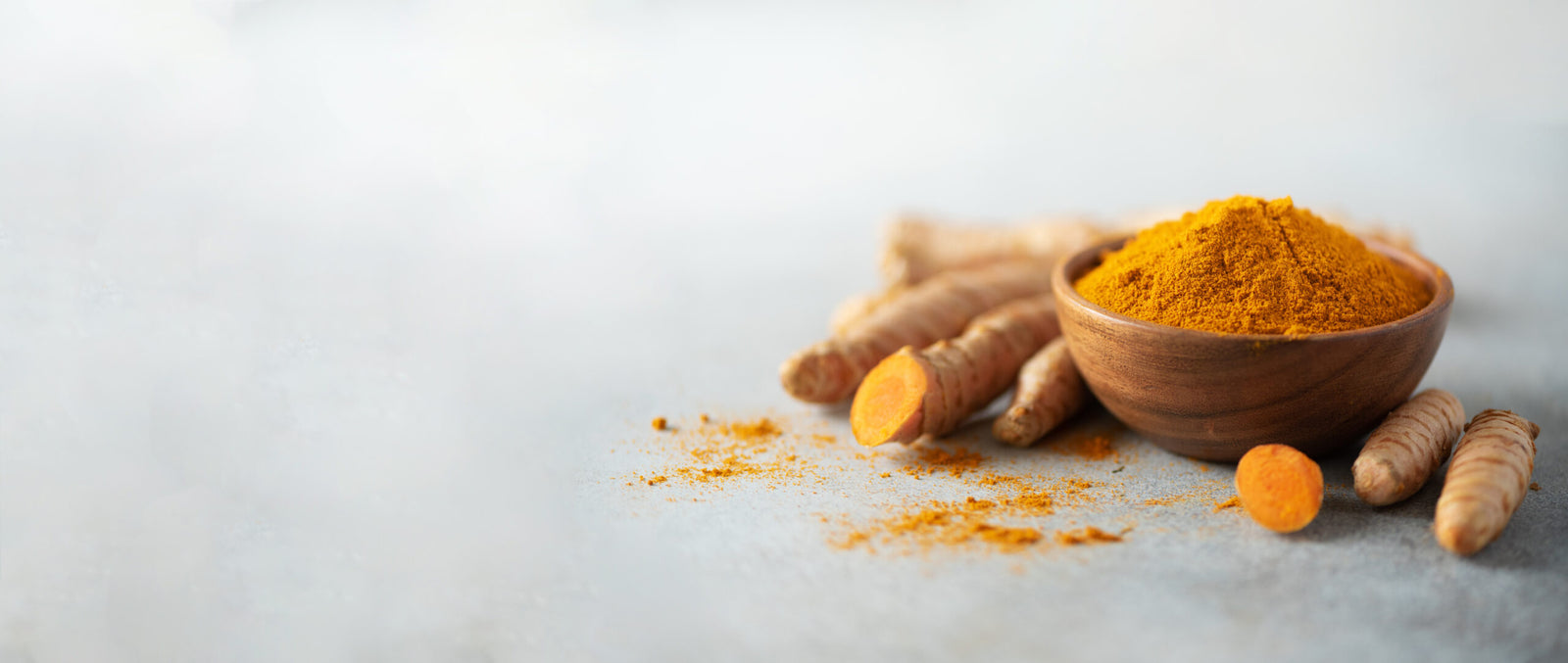
Turmeric (Curcuma longa) is a root spice with intense yellow-orange pigment that has been used for centuries all over the world in cooking, cosmetics, dye, and medicinal remedies. It is a key ingredient in South Asian and Indian cuisine where a lot of curry dishes utilize turmeric for coloring and flavor. In India, turmeric is also known for its medicinal properties in Ayurvedic medicine. The root spice’s effect on free radicals, natural anti-inflammatory, antimicrobial, antioxidant, and anti‐cancer properties have been evaluated in multiple scientific studies, as well.
Turmeric vs. Curcumin
Turmeric, also known as Haridra, is a root plant that can be sliced or grinded up in cooking or stewed to make tea. It has a bright yellow color and tastes slightly peppery, bitter, and earthy.
Curcumin (diferuloylmethane) is extracted from turmeric, and as such, is only available in powder form. Curcumin was first characterized and isolated as an active phytochemical component of turmeric in 1910. As a concentrated form of turmeric, curcumin shares many of its potential health benefits, including its anti-inflammatory, antimicrobial, antioxidant, anti-cancer properties. Some studies have even found that curcumin may be beneficial in helping mood disorders. But unlike turmeric, curcumin is incredibly hydrophobic, meaning that it is not absorbed well when ingested. To enhance absorption, black pepper, which contains piperine, should be added to curcumin when being ingested for health benefits. Turmeric is often used for clear skin diets.
What is turmeric good for?
Turmeric and curcumin have shown multiple health benefits to reduce inflammation. Some studies found turmeric ingestion to be beneficial for certain skin conditions such as acne and atopic dermatitis. Turmeric supplements have also been used to support digestive health and to reduce joint pain associated with inflammatory arthritis. Read more on how to use it properly without taking into consideration many food myths.
Recent studies have also demonstrated that orally ingested curcumin may effectively decrease lipid levels in patients with type‐2 diabetes mellitus and metabolic syndrome. Additionally, turmeric may even be protective against heart disease with its ability to lower levels of C‐reactive protein. Some studies also support that taking a turmeric supplement can improve moods in patients suffering from Major Depressive Disorder.

How to use turmeric and what is the best dosage?
Unlike medications, it is much harder to evaluate the dosage and effects of natural herbal extracts because of the difficulty in controlling the sourcing and concentration of the active ingredients. While there is no consensus on the best dosage, we know from studies that, in general, consumption of turmeric and curcumin supplements is safe. Several studies found curcumin was safe at the dose of six grams taken orally per day for four to seven weeks. However, some adverse effects such as gastrointestinal upsets may occur. Furthermore, oral bioavailable formulations of curcumin were safe at the dose of 500 milligrams, two times a day for 30 days. Given this data, it is generally recommended to take turmeric at doses lower than 1000 milligrams, twice a day. It is important for patients already on multiple medications to discuss taking turmeric or curcumin with their physicians before doing so, as they may interfere with the absorption of certain prescription medications.

What are the side effects of turmeric?
Turmeric does not usually cause serious side effects, but some people can experience stomach upset, nausea, dizziness, or diarrhea. I personally experienced an “overdose” of turmeric. I made turmeric tea using two tablespoons of the powder instead of two teaspoons. About an hour after I drank the tea, I felt nauseous and dizzy with a headache. Sure enough, I looked up “turmeric overdose” and the results matched my symptoms. The lesson was that it is much safer to take turmeric in small doses and to be patient and diligent when doing so. The health benefits of turmeric are usually seen with consistent daily intake, rather than a “binge” session.
Brighten discolorations and dark spots with our turmeric-infused Dark Spots No More!





Leave a comment (all fields required)